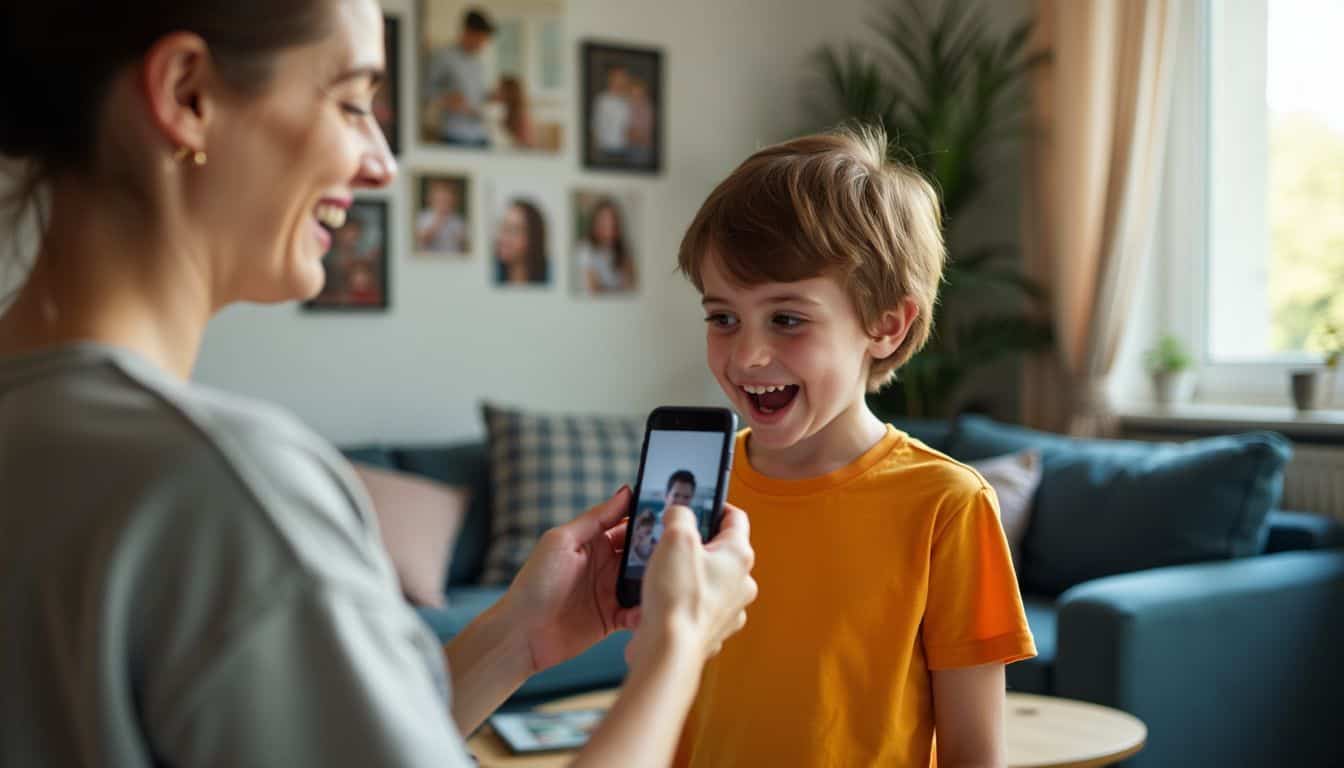Are you scratching your head, wondering if your kid’s ready for a phone? You’re not alone. Most parents give their children smartphones between ages 10 and 14. 2 This article will help you spot the signs that your child might be ready for their first phone.
We’ll cover six key indicators to watch for. Ready to become a phone-readiness detective?
Key Takeaways
Most kids get their first phone between ages 10-14, with 12 being the most common age.
Key signs of phone readiness include being responsible with belongings, following rules, and needing to stay in touch with parents.
Phones offer safety benefits and learning tools, but also risks like inappropriate content and too much screen time.
Setting clear usage limits, picking an appropriate basic model, and drafting a phone agreement are important steps for parents.
Warning signs a child may not be ready include often losing items and getting easily distracted by technology.
Table of Contents
Deciding the Appropriate Age for a Child’s First Phone
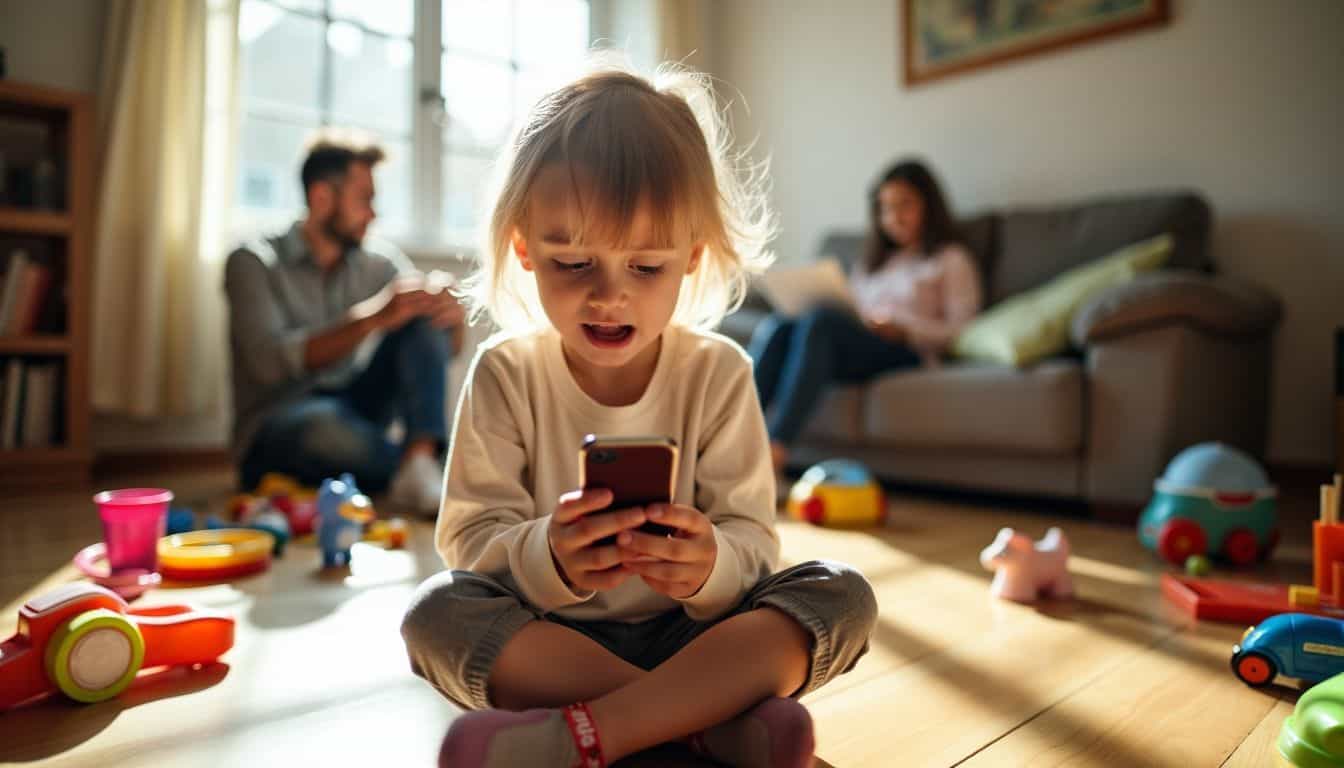
Picking the right age for a kid’s first phone is tricky. It’s like trying to figure out when they’re ready to ride a bike without training wheels – every child is different.
Key factors in age determination

Deciding when a kid’s ready for a phone isn’t a one-size-fits-all deal. It’s more like solving a puzzle with lots of pieces. Experts like Catherine Pearlman say ages 10 to 12 are often good starting points. 2 But it’s not just about age. You’ve got to look at the whole picture – how responsible the kid is, if they need to stay in touch while out and about, and if they can handle the tech.
The right age for a phone is when a child shows maturity and responsibility.
Here’s the scoop: Pew Research Center found that most folks think kids over 12 can handle smartphones. But some 9-year-olds might be ready too, especially if they’re starting to do things on their own.
It’s all about the kid’s needs and habits. Do they follow rules? Can they keep track of their stuff? These are big clues. And don’t forget – it’s okay to start small. Maybe a basic phone or smartwatch is the way to go at first. 1
Survey of common age benchmarks

Moving from the key factors that determine when a child should get a phone, let’s look at what most parents are actually doing. The numbers tell an interesting story. 3
Here’s a quick breakdown of common age benchmarks for kids getting their first phone:
| Age Range | Percentage | Notes |
|---|---|---|
| 7-11 years | 40% | American kids start using smartphones |
| 12-14 years | 73% | U.S. parents find this acceptable for smartphones |
| 12.2 years | N/A | Average age for first mobile phone |
| 12 years | N/A | Most common age parents give kids a phone |
Pretty eye-opening, right? These numbers show a clear trend. Most kids are getting phones around 12 years old. 1 But here’s the thing – a good chunk of kids are starting even earlier.
My nephew got his first phone at 10. His parents were split… but they gave in when he started after-school activities. It was all about staying in touch.
That fits with the data. A huge 71.1% of folks say they got their first phone to talk with mom and dad. It’s not about being cool – it’s about being connected.
So, what’s a tech-savvy parent to do? There’s no perfect age, but these benchmarks give us a good starting point. Just keep in mind – every kid is different. Your experience might not be the same!
Advantages of Mobile Phones for Children
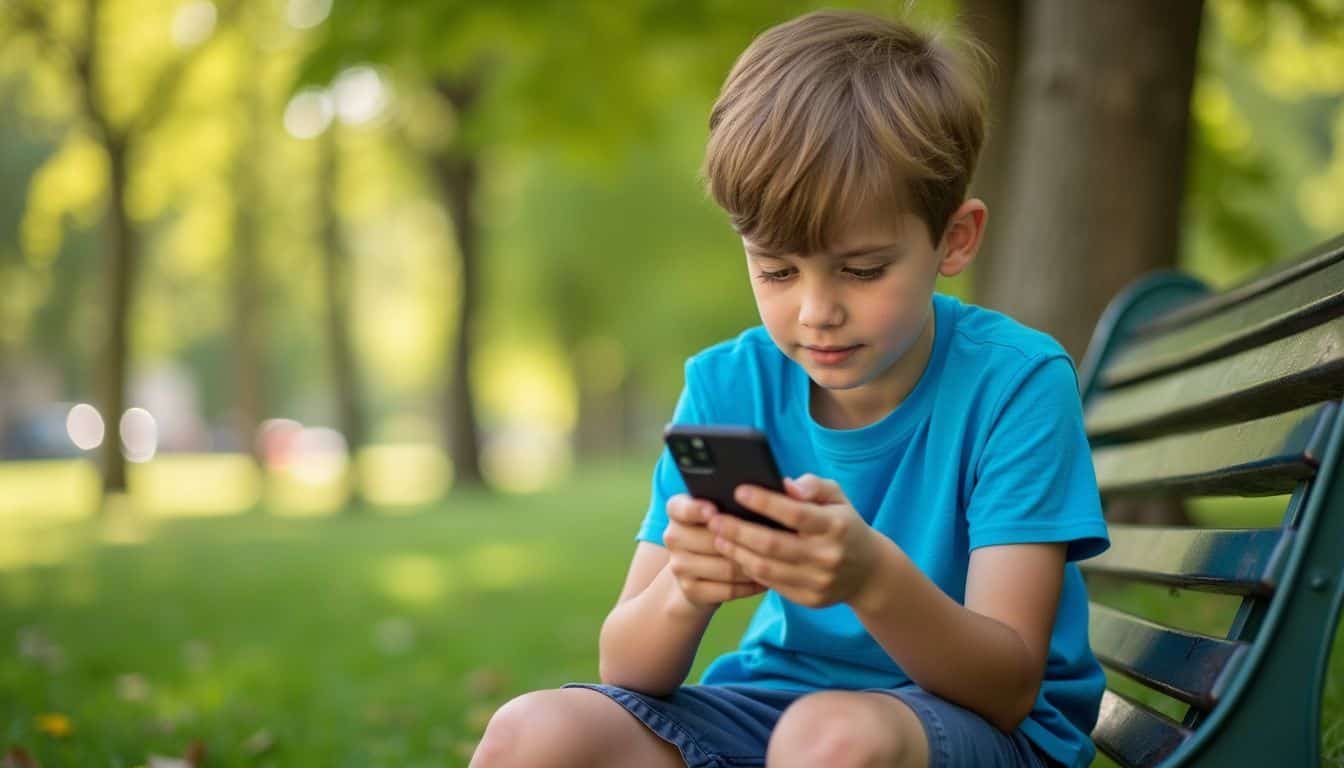
Mobile phones can be a lifeline for kids. They offer safety and learning tools at your child’s fingertips.
Enhanced safety and connectivity
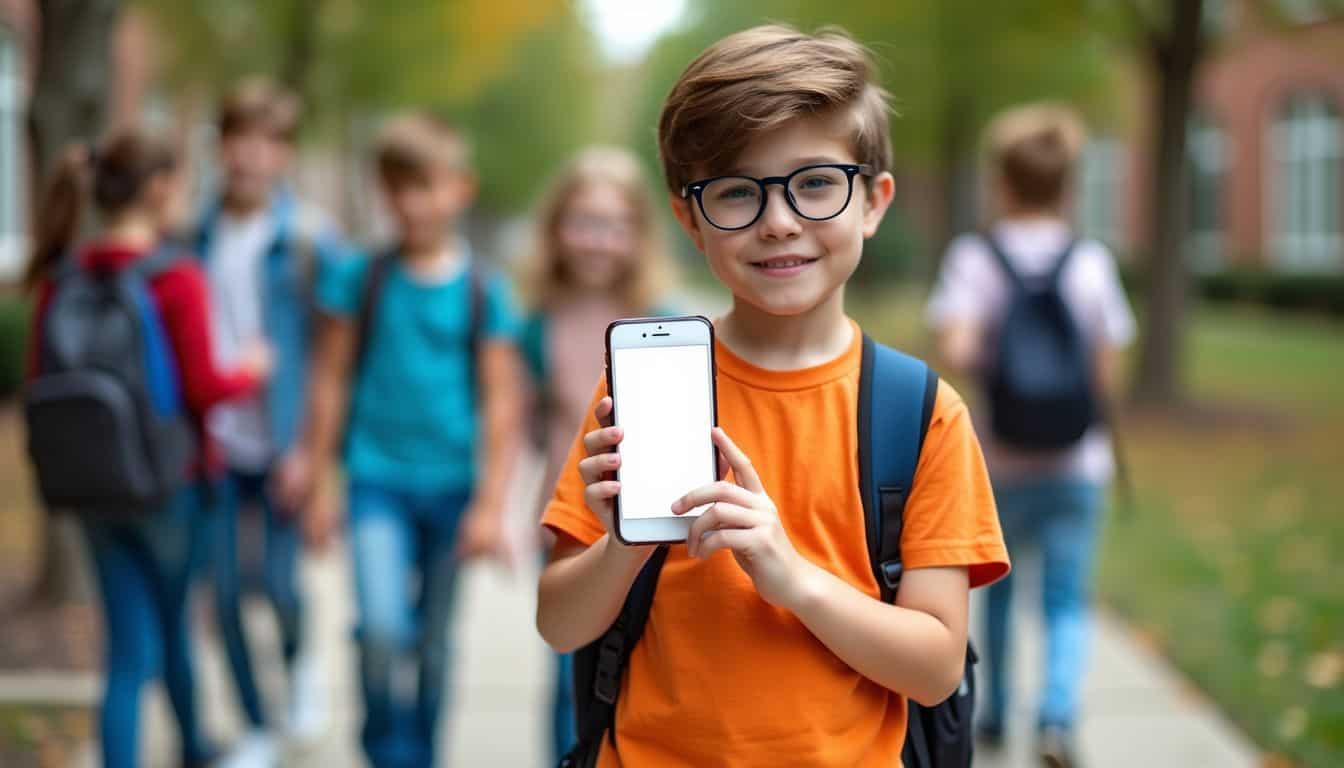
Phones can be a lifeline for kids. They let parents check in and kids call for help if needed. This is super handy when kids start going places alone. Like walking to school or hanging out with friends.
A phone means they’re just a call away if something goes wrong. 1
But phones do more than just call. They can track where a kid is. And send alerts if they leave a safe area. Some even have panic buttons. Pretty cool, right? Plus, with messaging apps, kids can stay in touch with family easily.
A phone is like a digital safety net for our kids in today’s world. 4
It’s not just about safety – it’s about peace of mind for everyone. Click here to find mobile phone plans specifically for children’s phones.
Learning tools and educational applications
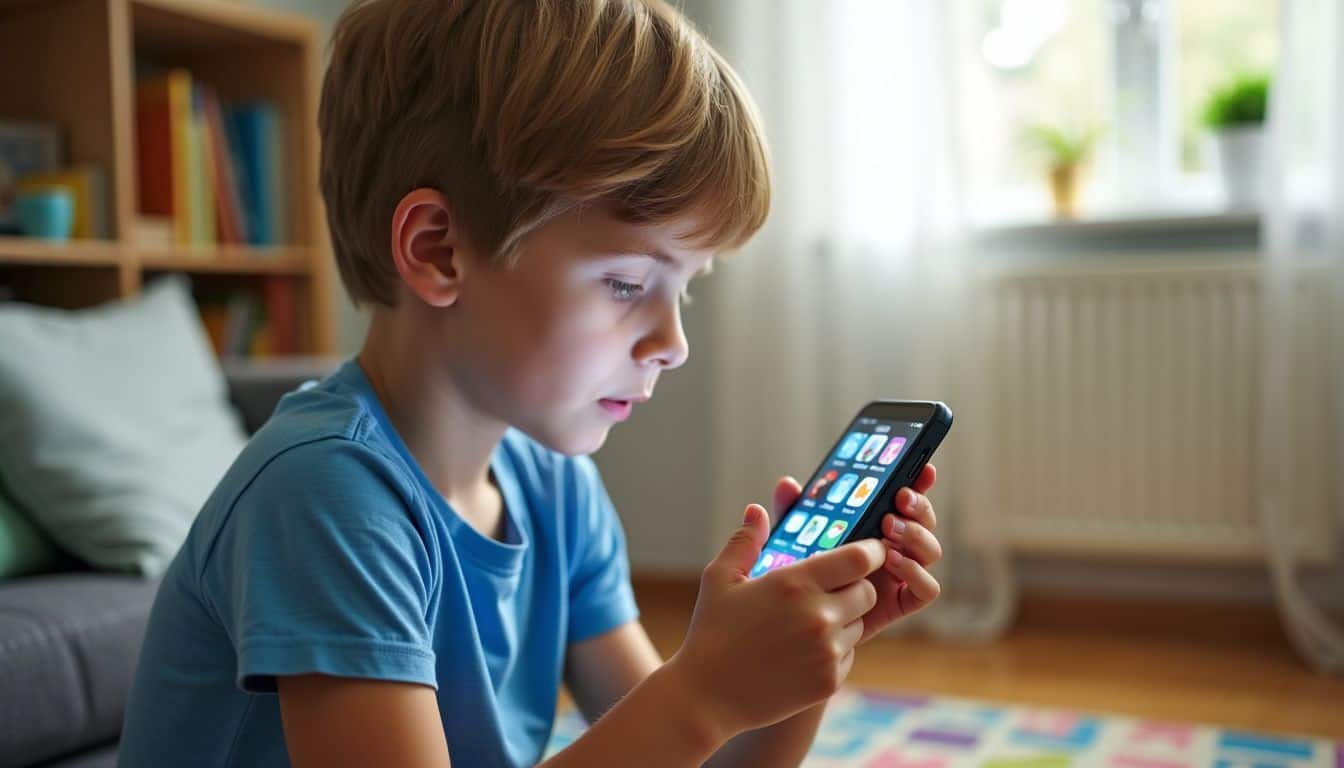
Smartphones are powerful tools for learning. They’re like mini-computers in your pocket, packed with apps to boost brainpower. Kids can explore math games, language lessons, and science simulations – all at their fingertips.
It’s no surprise that 53% of U.S. parents give their kids smartphones to help with schoolwork. 6
Here’s the thing – not all educational apps are equal. The free ones often struggle to keep kids engaged. Paid apps usually do better at making learning fun and memorable. Even preschoolers can learn new skills from the right interactive apps.
It’s about finding that balance between education and entertainment. 5
Challenges of Early Mobile Phone Access

Giving kids phones too soon can open a can of worms. They might stumble onto stuff that’s not kid-friendly or get hooked on endless scrolling – yikes!
Risks of encountering inappropriate content
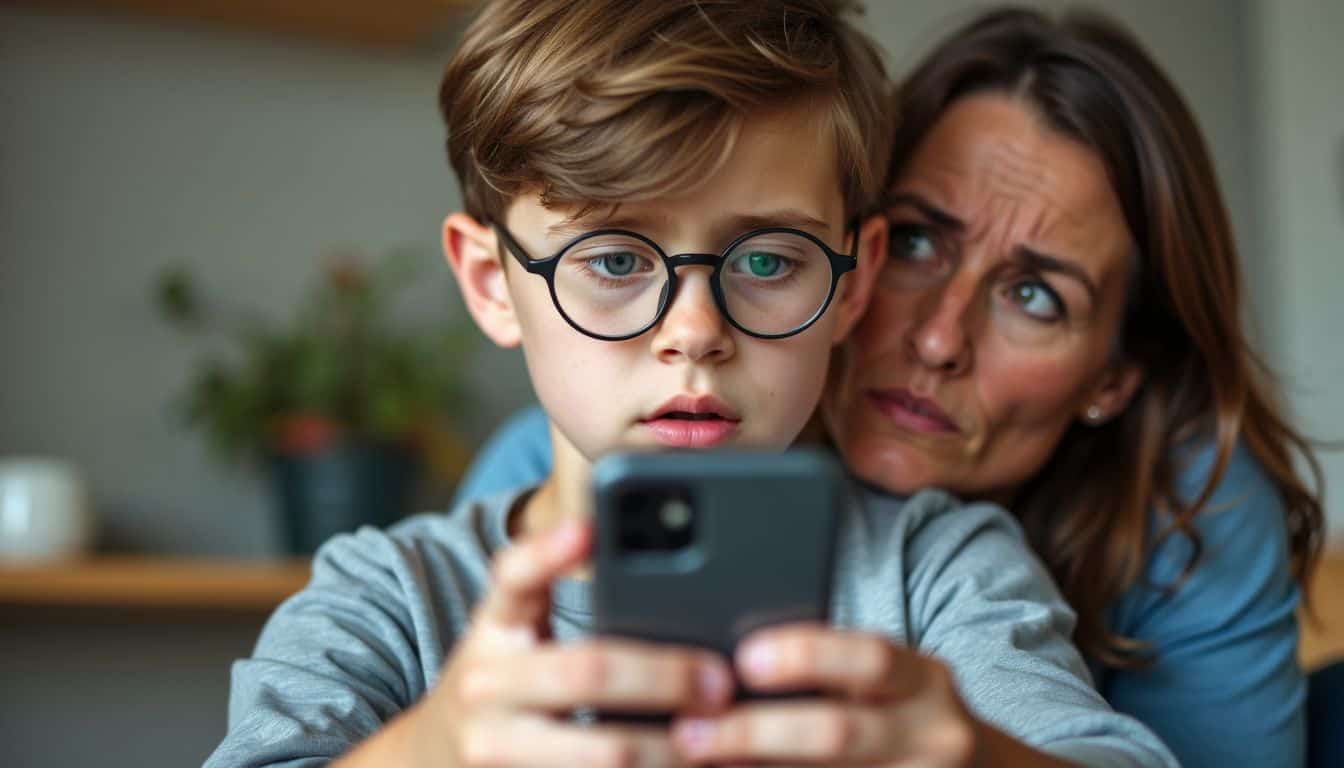
Kids with phones can stumble onto bad stuff online. It’s like leaving the front door wide open – you never know what might wander in. Porn, violence, and cyberbullies lurk in dark corners of the web.
One wrong click, and boom! A child’s eyes see things they can’t unsee.
Parents worry about this a lot. And they should. Early exposure to nasty content can mess with a kid’s brain and social skills. 7 That’s why many experts say to start with basic phones.
These limit what kids can access. It’s safer that way. Next up, let’s look at how too much screen time affects young minds. 1
Consequences of prolonged screen time
Too much screen time can mess with kids’ health. It’s linked to weight gain and other heart risks. 8 Kids who stare at screens all day often eat junk food and don’t move enough. This can lead to obesity and other health issues down the road.
Screens also wreck sleep. The blue light from phones and tablets tricks the brain into thinking it’s daytime. This makes it hard for kids to fall asleep at night. 9 Poor sleep hurts school work too.
Tired kids have trouble focusing and learning new things. Plus, cyberbullying on social media can cause serious mental health problems.
The internet is so big, so powerful and pointless that for some people it is a complete substitute for life. – Andrew Brown
Next, let’s look at some parental guidelines for phone usage…
Parental Guidelines for Phone Usage

Setting phone rules isn’t just about saying “no.” It’s about teaching kids to use tech wisely. Parents can start by picking a phone that fits their child’s needs and setting clear limits on screen time.
Implementing usage limits and rules
Setting clear limits on phone use is key. Parents should create a plan that fits their family’s needs. This might include no phones at dinner or after 9 PM. It’s smart to make kids charge phones outside their rooms at night.
This helps them sleep better and avoid late-night texting. 2
Rules matter too. Kids should know what’s okay and what’s not on their phones. No mean texts, no sharing personal info online, and no talking to strangers are good starting points.
Parents can use parental controls to block certain apps or websites. But talking about why these rules exist is just as important as having them. It helps kids understand and follow the rules better. 10
Selecting an appropriate phone model
Once you’ve set rules, it’s time to pick the right phone. For kids, simple is better. A basic model with calling and texting works great. No need for fancy apps or internet access. 10
The best phone for a child is one that connects them to you, not the internet. 1
Let’s talk options. The Kids Smartwatch is a good starter. It has preset texts and no web browsing. Parents control the contact list. Another choice? The Gabb Watch 3. It costs $149.99 with plans from $12.99 to $17.99 monthly.
Both keep kids safe while staying connected.
Indicators Your Child May Be Ready for a Phone

Is your kid ready for a phone? Look for these telltale signs. They might surprise you – and help you make the right call.
Demonstrating responsibility with personal items
Kids who take good care of their stuff show they might be ready for a phone. It’s a big deal when a child keeps track of their backpack, toys, or homework without being nagged. This proves they can handle pricey gadgets.
Parents, take note! If your kid brings home all their school supplies and doesn’t lose their lunch box, that’s a good sign. It means they’re growing up and can be trusted with more grown-up items. 11
But it’s not just about not losing things. How a child treats their belongings matters too. Do they toss their bike on the lawn or carefully put it away? Are their books dog-eared or neatly shelved? These little habits speak volumes.
Next up, let’s look at how well kids follow rules – another key sign of phone readiness. 1
Following set rules and guidelines effectively
Showing you can handle stuff is great, but following rules is key. Kids who stick to set guidelines prove they’re ready for a phone. It’s not just about keeping track of the device.
It’s about using it right. 11
Clear rules are a must before handing over a phone. Parents should lay out do’s and don’ts. Things like screen time limits, app restrictions, and online behavior matter. Kids who follow these rules show they get it.
They understand the trust placed in them. This readiness is crucial for safe, smart phone use. 1
Warning Signs Your Child May Not Be Ready for a Phone

Kids can be tricky with tech. They might lose stuff or get too hooked on games. These are red flags that say, “Hey, maybe wait a bit before handing over that shiny new phone.
Tendency to misplace belongings
Kids who often misplace items might not be ready for a phone. It’s important. Phones are expensive and easy to drop or forget. If your child struggles to keep track of their lunch box or backpack, a phone might be too much responsibility.
Consider this – 71.1% of people got their first phone because they needed it. 1 But if your child isn’t careful with their belongings, they might not need one yet.
Let’s be honest. Phones are like mini computers these days. They’re filled with personal info and interesting apps. But they’re also small and easy to drop. If your child’s always asking, “Where’s my…?” it might be wise to wait. 12 Maybe start with an inexpensive flip phone instead. It’s less of a risk if it gets lost. Plus, it’ll help you gauge if they can handle the responsibility. There’s no hurry – the right time varies for each child.
Distraction issues with technology
Tech can be a real attention-grabber. Kids often get sucked into their screens, losing track of time and tasks. I’ve seen my nephew glued to his phone for hours, ignoring homework and family time.
It’s not just kids, though. Adults struggle too. We check our phones an average of 96 times a day!
This constant distraction can hurt focus and learning. Studies show that heavy tech use may lead to shorter attention spans. It can also mess with sleep patterns. Less sleep on school nights is a common issue for young phone owners. 13 But it’s not all doom and gloom. There are ways to balance tech use and stay focused. Setting screen time limits and creating tech-free zones can help. For when kids are bored, try fun offline activities.
Next, let’s look at some signs that your child might be ready for a phone. 10
Introducing Responsible Phone Usage to Your Child

Getting your kid ready for their first phone? It’s like teaching them to drive… but with emojis. Sit down with your child and chat about why phones are cool – and why they need some ground rules.
Explaining the rationale behind phone privileges
Kids need to grasp why they’re getting a phone. It’s not just a cool gadget – it’s a tool with real purposes. Parents should chat about safety, staying in touch, and planning after-school stuff.
These are the big reasons kids often get phones. 1 But it’s key to set clear rules from the get-go. What’s okay and what’s not? When can they use it? For how long? Laying this out helps kids see their phone as a privilege, not a right.
Talking about phone use is a chance to teach responsibility. It’s like training wheels for the digital world. Parents can explain how phones can help with homework or learning new things.
But they should also point out risks, like too much screen time or seeing bad stuff online. By spelling it all out, kids learn to use their phone wisely. It’s not about control – it’s about growing up smart in a tech-filled world. 10
Drafting a phone usage agreement
Creating a phone usage agreement is important for parents giving their kids their first phone. It’s a chance to discuss technology and establish clear boundaries. 10 Sit down with your child and work out the details together.
Cover topics like screen time, app downloads, and online safety. Include consequences for rule violations.
Once you’ve agreed, write it all down. This clarifies the rules for everyone involved. 14 You could even add tech-related incentives for good behavior – like extra app time for completing homework early.
The aim is to teach responsible phone use, not to be overly controlling.
People Also Ask
What’s the right age for a kid to get a phone?
There’s no one-size-fits-all answer. It depends on the child’s maturity and needs. Some tweens are ready at 10, while others might need to wait until their teens. The key is to look for signs of readiness.
How can I tell if my child is ready for a smartphone?
Watch for these signs: They follow rules at home and school, show good judgment online, and can handle basic tech tasks. Also, check if they need a phone for safety or to stay in touch with you.
What are the risks of giving a phone too early?
Early phone use can lead to smartphone addiction or nomophobia – fear of being without a phone. It might also expose kids to inappropriate content on social media sites or through instant messaging.
How can I protect my child’s privacy on their first phone?
Set up user profiles with strong passwords and privacy settings. Teach them about cookies, AdSense, and how to stay safe on social networks. Talk about sharing personal info with their internet service provider.
Can phones help with learning and development?
Yes! Phones can be great tools for problem-solving and critical thinking. Kids can use educational websites, read e-books, or even create content on YouTube. But balance is key to maintain digital health.
What alternatives are there to smartphones for younger kids?
Consider smartwatches or basic cell phones for calls and text messages. These limit internet access and social media use while still letting you stay in touch. As James P. Steyer says, “Start slow and build trust.”
References
^ https://www.ncbi.nlm.nih.gov/pmc/articles/PMC9664330/
^ https://www.washingtonpost.com/technology/2023/what-age-kid-phone/
^ https://www.safewise.com/what-age-should-kids-get-a-phone/
^ https://www.ncbi.nlm.nih.gov/pmc/articles/PMC9200624/
^ https://www.ncbi.nlm.nih.gov/pmc/articles/PMC8916741/
^ https://www.ncbi.nlm.nih.gov/pmc/articles/PMC8800936/
^ https://research.com/education/what-age-should-a-child-get-a-smartphone
^ https://www.ncbi.nlm.nih.gov/pmc/articles/PMC10605067/
^ https://www.ncbi.nlm.nih.gov/pmc/articles/PMC10353947/
^ https://childmind.org/article/when-should-you-get-your-kid-a-phone/ (2023-10-30)
^ https://www.understood.org/en/articles/checklist-signs-your-child-is-ready-for-a-cell-phone
^ https://devorahheitner.com/child-isnt-ready-phone-parenting-decision/
^ https://med.stanford.edu/news/all-news/2022/11/children-mobile-phone-age.html (2022-11-21)
^ https://feld.com/archives/2019/10/cellphone-contract-for-a-childs-first-cell-phone/ (2019-10-24)
